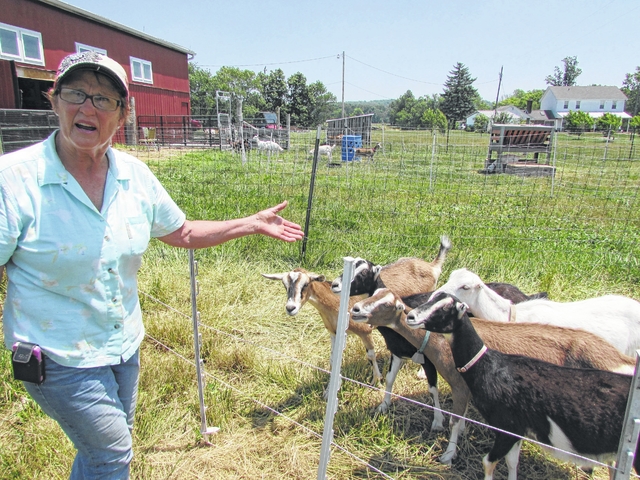
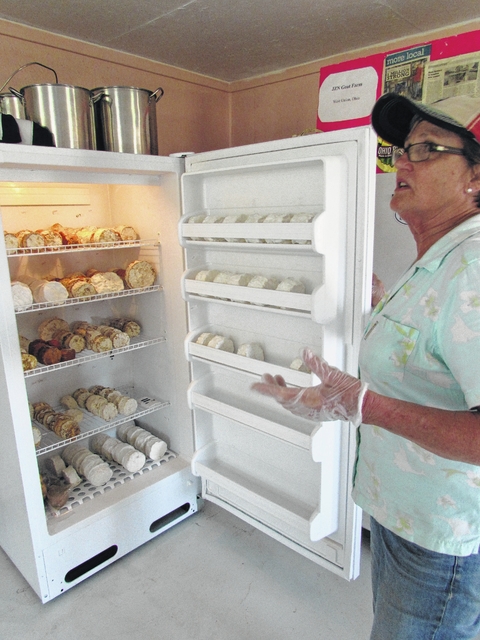
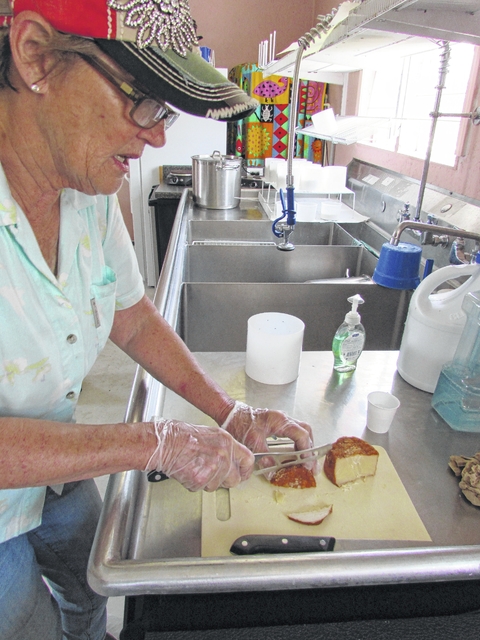
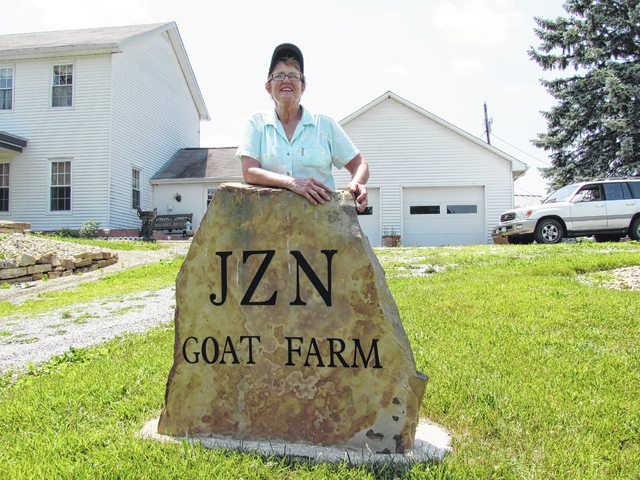
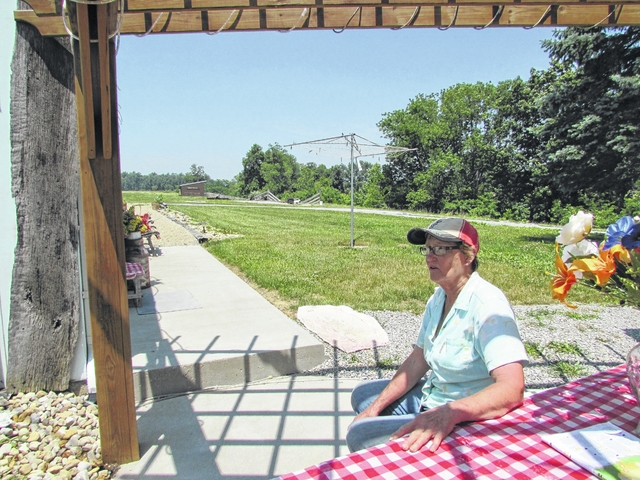
There is no way to curb the enthusiasm of Winchester farm woman Gayla Fritzhand.
Ask her a question about farming – any question – and you can hear the excitement in her voice, a passion in her words.
Gayla Fritzhand is a woman who loves what she does.
And what she does it own and operate the 126-acre JZN Goat Farm near Winchester. On her farm she raises meat and dairy goats and also does a thriving goat cheese business.
While she is passionate about many things, what she thinks is most important for a farmer today is for the farmer to “get involved. You need to be informed and to always network. And, you need to be more than just members of the farm organizations, you need to read the newsletters and reports they send you.”
She practices what she preaches.
She is a member of the Ohio Cheesemakers Guild, now in its second year and she is one of 16 women in Ohio who are licensed by the Ohio Dept. of Agriculture to make and sell cheese. She is also an active member of the Ohio AgriWomen organization. “When I went to their convention last November, it made me feel really good. It made me feel like … I can do this.”
She is active in the Ohio Ecological Farm and Food Association. “I have been a member of OEFFA from the beginning,” she said, and likes the organizations education programs and views on organic food.
She is active in the Adams County Chamber of Commerce as well as the Adams County Travel and Visitors Bureau. She said the local business people are “our colleagues. You can learn from them business practices.”
On her farm, as a supporter of agri-tourism, she conducts tours by appointment for “about six to eight people.” She has on her farm the third longest zipline in Ohio. She said it was prepared by the same person who set up the zipline in the Hocking Hills.
“If people call to make appointment, I will conduct free tours on the farm.” However, she said they may charge for the tours at some point in the future.
A walk on her farm
Fritzhand loves showing visitors her farm and the goats she loves to raise.
Walking through her rolling fields, Fritzhand talks about her dairy and meat goats and points out the goats by name. She knows all of them. “That’s Johnny Cash over there looking at me, there’s Princess, Bambi…Fancy…Clove… there is Latte…” she shouts out their names, and they begin running from a back field. She is proud of her goats, talking to them and describing the personalities of each.
She said her goats, she has about 18 dairy and 18 meat goats, were all born on her farm and are breed-quality stock. “I know all of them, and know their needs, I monitor them and make sure they have what they need.”
Fritzhand says she does not sell any of her goats’ milk, since the processing and labeling is too costly for the size of her farm.
Walking toward her farmhouse, she points out the nearby cheesehouse. “This was originally an old steel building at Armco in Middletown,” she said. “I asked the dairy inspector even before I started if I could fix it up and be able to meet the regulations to turn it into a cheese processing facility. He said yes, he thought I could if I worked hard enough and spent enough money to fix it up. So I did that.”
She said she met all the regulations after installing all the special lights, drains and metal sinks. She milks in the barn, then brings the goat’s milk down to the cheesehouse for straining and processing.
“My dairy inspector has been absolutely marvelous to work with. He cautioned me, saying, ‘Gayla, are you sure this is what you want to do?’ and I said yes, since moving back here I did the research and this is what I want to do,” she said.
“If it had not been for the good help of the ODA, the Ohio Department of Agriculture, I certainly could not have developed the business or the farm. My dairy inspector is one who only goes to cheese processing facilities,” she said.
“Now, the younger generation, they have decided they want to eat whole foods. They don’t want GMOs, they want everything to be natural and good. They have found us cheesemakers,” Fritzhand said. She said the Cheesemakers Guild is a way for the cheesemakers to network, talk to each other and get help when they need it and share ideas.
In a recent issue of Cleveland’s “Edible Ohio” magazine, she and her fellow women cheesemakers were featured in an article about women cheesemakers throughout the state.
She took courses in cheesemaking that were offered by the Ohio Dept. of Agriculture. “They hired an instructor from Vermont, very well known, to teach farmers to make cheese from their own milk on the farm.” She pointed out that the ODA regulations are strict and necessary. “It takes a lot of diligence and you must be conscientious in following the regulations,” she said.
Active and involved
“I have to say that during the last couple of years, it is obvious the state of Ohio is encouraging small farmers. You can feel it. Even though there are a lot of regulations, you can still feel that they want to help you. They don’t want to put you out of business.” She said that “it helps” that ODA Director Dave Daniels from Greenfield is from a rural community.
She said marketing is important for her small farm operation. “Ohio Proud is another group that has helped. I am a member, and on their website they market and support small farm businesses.”
Last fall, she traveled to Highland County to attend the Highland Farm Bureau’s first “Farm to Fork” dinner on a local farm. She said she really enjoyed that and wanted to learn about how other counties were progressing. “They were a little more sophisticated and progressive in Highland County,” she said.
She is active in the Adams County Farm Bureau, and says, “I like that Farm Bureau has these events on farms. It takes a farmer willing to open up and have visitors on the farm for the event. She said not all farmers feel comfortable doing this.
“I am a member of Adams County Farm Bureau and would be willing to have a farm to dinner event here. I thought I would volunteer to host, so come and visit,” she said.
A love of Adams County
Born and raised near Winchester, her mother Helen Shaw was a teacher and father Harold Shaw was a farmer and operated a local feed mill. She was one of eight siblings. “We were tobacco farmers then. That was our life and bloodline. But the tobacco industry, as you know, changed.”
Her father owned the Pillsbury Feed Mill. “It was pretty big and thriving. Most of my friends at school in Winchester, their families were dairy farmers back then. The dairy industry was very big back then and the farmers did well,” she said.
After high school in 1965, she attended the University of Cincinnati and received her degree in nursing. She spent a year in Colombia at a missionary as a nurse. She said this was where she was first exposed to goat cheese and goat milk. She then returned and received her Master’s Degree at Xavier University. She also taught nursing, and work in health services, including work for United Health Care.
But the draw of the farm continued to tug at her. “I said to my sons, I want to do what I really want to do. I told my sister that I am coming back to do what I love in a place that I love.”
She has owned her farm for the last 10 years. “My sons, Jeremy, Nicholas and Zachery, were very supportive. They said mom, get back to the country.” I had looked around about a year and half. I knew this region and drove around looking for farms. I told my sister, I think I will just start knocking on doors and tellin
g them I am looking for a farm.”
She said she knew she couldn’t have machinery, tractors are expensive. “I knew I needed a place I could grow, and was warning about spending all of my capital on the farm and equipment” She needed a farm where she could grow alfalfa and support a herd of dairy goats. She grows about 40 acres of alfalfa today. “You have to be self-sufficient when you can’t afford to buy alfalfa when the price is so high.”
Making the cheese
One of her greatest pleasures is making cheese.
Inside her cheese production house, she describes step by step how the goat cheese is made. She starts with the goat’s milk, which she then strains. She then waits 24-48 hours with the milk kept at about 40 degrees. She then puts the stock pots of milk on burner until it reaches 78 degrees.
She then takes the pot off the burner and adds French cultures through a Canadian dairy. She then adds an animal rennet. After about 12 hours the curd and whey separates. She pours away the whey and places the curd in molds. After a number of other steps, the molds are left to age for at least 60 days, when they can be legally sold.
However, Fritzhand says most of her cheese is aged at least a year, when the flavor is at its best.
But once the cheese is made, she says the most important step is actually selling it, as well as her goat meat.
Excitedly, Fritzhand talked about the upcoming religious Ramadan holiday. “You need to get your meat goats ready to send to the producers, processors. She described ways of making the most out of knowing about these specialty markets and what consumers want – and when they want it. “You have to watch the market always if you are going to make it.’
By using her website, she can get to know her customers. She ships her cheese to customers or they can pick it up at her farm. “And get signature confirmation,” she advised.
Words of wisdom
As a woman who has operated her own successful farm for the last 10 years, what advice would she gives others just starting or considering starting to operate a farm, and what lessons has she learned over these years?
“You have to love what you are doing. You have to enjoy what you are doing. The joy and satisfaction you get from what you are doing can sometimes far outweigh the amount of income you get from that activity,” she said.
“If you really love the outdoors. If you really love animals, which I do – I love the barn, I love the animals. I like working in the business where science is an important part of it. Your animals have to be in good health – so you have to monitor them. You have to feed them well. Their housing as to be kept clean. If you enjoy all of those things, then it is not work,” she said.
On the other side of that, there is a very large amount of capital that goes into setting up something like this, she pointed out. “It is hard. You have to run it as a farm. It has to be self-sustaining. In other words, you have to grow your own alfalfa or you can’t do what I do here. You have to be able to know math, to do your own books. You must keep good records, the accounts and your investment records. You have to test the soil regularly. You need a good understanding of soil management. You have to know how to extract the samples, send them to a reliable laboratory and then be able to understand the data so if necessary you can fix the soil so you can grow what you want to grow.”
She said, “You may love the work, but remember that you are working to produce a product. You also have to find the market, and find that market before you start, at the beginning. You don’t want leftover product without being able to sell it or get it to market. You need to know who your consumers are.”
She is hard-working, but realizes that she needs to balance work with rest. “I make cheese seasonally rather than all year. That’s for my goats and for my health. The winters here are cold. It’s a good time for me to rest and re-evaluate, take care of myself, take care of the taxes and paperwork, find the market, spend time with the family. If I had more help and more hands, I could have a bigger herd and sell more.”
Is she happy with the decision she made 10 years ago to start her own farm?
“I love it. I love nature, and love what I do. Look at this view I have,” she said, gesturing to the west where the rolling hills of her farm seem to go on forever. “I love the vegetation… I can walk through the woods here and tell you names of most all of the plants. I just love all of this.”
Gary Brock can be reached at 937-556-5759 or on Twitter at GBrock4.


